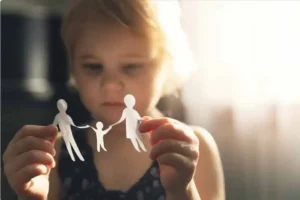
Our mission at KohParenting is grounded in the importance of self-reflection and the key role it plays in co-parenting. Research demonstrates that it can increase effectiveness and satisfaction in parenting partners and children alike. But what does this common buzzword even mean? And how can you harness its power for your benefit? Join us as we dive deeper into the topic to uncover the rationale behind self-reflection and the ways it can step up your co-parenting game.
The Gist
Self-reflection means thinking about one’s thoughts, feelings, and actions and their impact on oneself and others. Being reflective means asking yourself questions about your beliefs and actions and then challenging them.
Self-Reflection: A Necessary Practice in All Relationships
Self-reflection simply refers to the act of pausing to think about one’s thoughts, feelings, and actions. Engaging in self-reflection often means asking yourself about the impact of those thoughts, feelings, and actions on your well-being and the well-being of the environment and people around you. This can be useful in all aspects of your life, but when applied to parenting (and co-parenting) it has the power to change the dynamics of your relationship.
Let’s pretend for a moment that you have been hired for the most challenging job of your life, to build something from the ground up, with entirely raw material. Your training consists primarily of your past experiences, tons of conflicting information from all your colleagues around you, and whatever you can pick up instinctively on the fly. How would you approach this project? Would you forge ahead blindly, regardless of the outcome, without ever pausing to plan or evaluate how you’re doing? Would you blame the material when things go wrong? Would you disregard the feedback of experts in the field and push through with your own method even if it wasn’t working?
It’s likely if you did any of these things in a “traditional” job, you’d be sternly rebuked or even fired. But when it comes to parenting, many of us set ourselves on automatic pilot and allow ourselves to be controlled by our subconscious. Sometimes, this works out in our favor, but other times, when those subconscious drives are maladaptive, it can have disastrous consequences. We may be stuck in a counterproductive pattern of behavior that causes harm to ourselves and others. To gain back our power, we need to become conscious of what we are doing, feeling, and thinking- and this is exactly what self-reflection can do for us.
Self-Reflection and Co-Parenting:
Relationships are a two-way street; it’s impossible to isolate the actions of one party because both are constantly exerting an influence on each other. Your behavior impacts your co-parent’s behavior, and your co-parent’s behavior impacts your own; your behavior impacts your child’s behavior, and your child’s behavior impacts your own. Self-reflection can then be an agent of change not only for you but for those people with whom you are in close relationship. restrict_after You can’t force your parenting partner or your child into anything, but you may be able to influence them to do things differently by doing things differently yourself.
Reflective practice doesn’t just uncover information about the self. A thorough examination of your behavior may also lead you to realizations about other people, including your co-parent and child. You can apply the same skills you’ve practiced in analyzing your thoughts, feelings and actions to become a careful observer of those around you. You can begin to see and understand their true needs and reactions; you can begin to see opportunities for connection and repair in your relationships.
For example, you may identify things that you’ve been doing that don’t work for your child or co-parent. After reflecting on difficult situations, you may also realize you reacted out of strong emotions that had nothing to do with the moment (that is- you overreacted). Conversely, you could also notice times when something in your approach triggered your child or co-parent to react out of strong emotions. You could also piece out ways in which your child or co-parent may be violating your boundaries and causing you stress, or areas in which you could assert yourself and your needs. Or perhaps you become more aware of what’s going on in your life or environment that could be impacting your behavior.
Moving forward, you can read your child’s cues better and respond in nurturing, supportive ways- which makes you a more effective parent. Meanwhile, you can also apply the knowledge you’ve acquired to your interactions with your parenting partner. This can decrease conflict and help you to achieve your desired outcome: a healthier co-parenting relationship.
If you’re interested in hearing what the research has to say about self-reflection, check out this study.
The Key to Self-Reflection: Think Like a Toddler!
If you’re trying to picture self-reflection in the real world, look no further than the toddler brain. Little ones often model this type of inquiry; they thirst for knowledge and always want to know “Why?” Answers to their questions only spur them on further, as they continue to ask over and over again to expand their understanding. We adults often find this tendency irksome, but we can stand to learn a lot from it. To become self-reflective, emulate their curiosity; notice what you’re doing, thinking, and feeling, and continue to ask yourself about it, layer after layer, to uncover deeper levels of awareness.

Here are some examples of the knowledge you can find through self-reflection:
-
- Identification of triggers: You may be able to notice that a particular person, place, situation, etc. brings on strong feelings, which then impact your behavior.
Flaws in your thought processes: Upon reflection, you may notice that you made assumptions or jumped to conclusions without logical evidence.
Misalignment in your values and actions: Perhaps in hindsight, you realize that your behavior does not align with the values you hold in your mind.
Subconscious biases: When you stop to pick apart your beliefs, you may notice that you have developed biases against categories of people or places. Our brains instinctively try to categorize information so that we can understand it better, so it’s common for us to have these biases, but they’re not healthy for us and can hold us back.
Issues with your own upbringing: Most of what we know about parenting comes from the way in which our own parents raised us. We tend to follow their lead without even realizing it… until we begin to examine our behavior. At that point, we may become conscious of negative habits or thoughts that we acquired during our childhood.
Harnessing the Power of Self-Reflection:
If you’ve read this far, you may be wondering, “How am I supposed to analyze my parenting, while parenting?” This process may at first seem like rubbing your head and patting your belly at the same time! How can you do these things simultaneously? Well, the simple answer is: you can’t- not at the same time, anyway. The human brain physically cannot multi-task. However, what you can do is learn to reflect on things that have happened, notice trends or patterns, and then pay attention to those trends or patterns in the future. With practice, you can even become mindful enough that you can pause and course-correct, or otherwise adjust your behavior, in the moment. Let’s break down these skills a bit further.
- Consider journaling or keeping an ongoing record of your thoughts, feelings, and actions- particularly around sticky issues. In regard to your co-parenting, this may mean that you take note of challenging interactions with your parenting partner or child and describe not only what they were doing that bothered you but also what you were doing. Ask yourself questions like, what was happening before/after? What thoughts were going through my head? What actions did I take, and when?
- Explore your past: Think about how your own caregivers raised you. How did they discipline you? Teach you? Show affection for you? What messages do you believe you learned from them about how to be a parent? How did their parenting make you feel?
- Take inventory of your beliefs and values. What is important to you as a person, as a partner, as a parent? What morals do you wish to impart to your child? Does your current behavior align with your values? What messages are sending your co-parent and child with your behavior?
- What are your expectations of your parenting partner and your child? What does it mean to you to be a “co-parent?” What does being a child mean to you? How do you think a child should think/act/behave?
- What do you know about best practices in co-parenting? How does your behavior compare to those practices? What type of co-parent would you like to be?
- Grounding exercises: To bring yourself back to earth when you’re feeling overwhelmed, tune in to your 5 senses. What do you see? Smell? Feel? etc.
- Noticing: Observe what’s happening, but without judgment. Imagine that you are sportscasting what’s going on in a purely factual, neutral way. Avoiding giving a valuation to everything can help you to see things accurately.
- Breathing, pausing, taking a moment: Give yourself the time and space to slow things down. Breathing exercises can help get the blood flowing to the brain so that you can think clearly. You may also wish to step away from a negative or triggering situation for a moment so that you can calm down.
- Correcting yourself when you need to/want to/regret something you have said or done:It’s okay to take a “do-over!” You can say something like, “That wasn’t what I meant to say. Let me try again.”
- Notice the thoughts going on in your head. Talk back to the negative ones or the ones that don’t serve you. It can be helpful to even craft your own mantra for difficult scenarios that you can repeat as a reminder, such as “I can handle this,” or “I am worthy,” etc.
A word of caution here: Self-reflection is not the same as self-doubt. Being self-reflective means putting on your “investigator” hat and seeking information and understanding about yourself; it does NOT mean viewing yourself with a judgmental, punitive lens. Be mindful not to let a healthy self-reflection habit turn into over-analysis; constantly overthinking what you have done, what you’re currently doing, or what you’re about to do, can lead to feelngs of inadequacy or anxiety that can paralyze you and stunt your personal growth.
Healthier co-parenting, starting with a healthier you.
The law of attraction states that whatever we receive from the universe is a direct reflection of what we put into it. The same could be said of co-parenting: our parenting partners’ and children’s behavior toward us often serves as a mirror to our own behavior. Through self-reflection, we have the power to execute positive change, to enhance our lives and improve our relationships.
Speaking of positive change and enhancing lives… let’s talk about school! Next week, we’ll check back in on the topic by exploring how co-parents can nurture a strong home-school connection for their children.
Where you can stay informed on what’s happening in the world of co-parenting and learn more about what we do.




